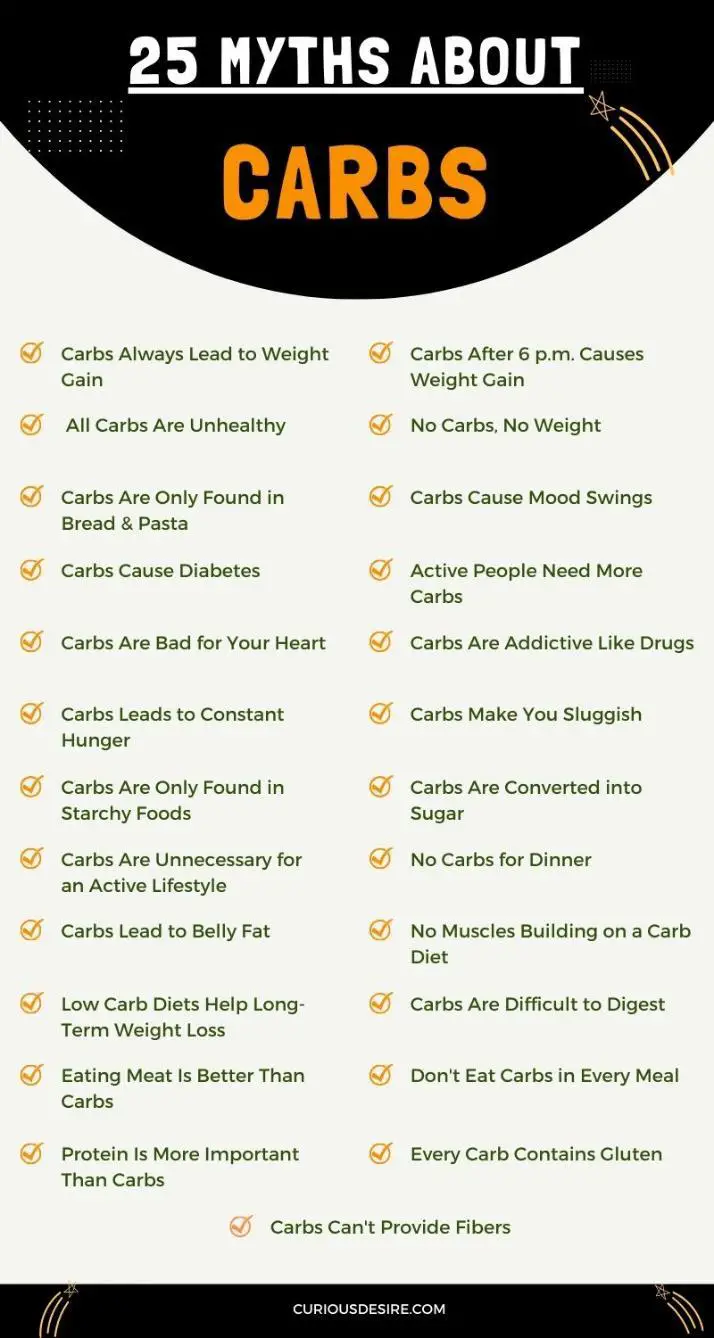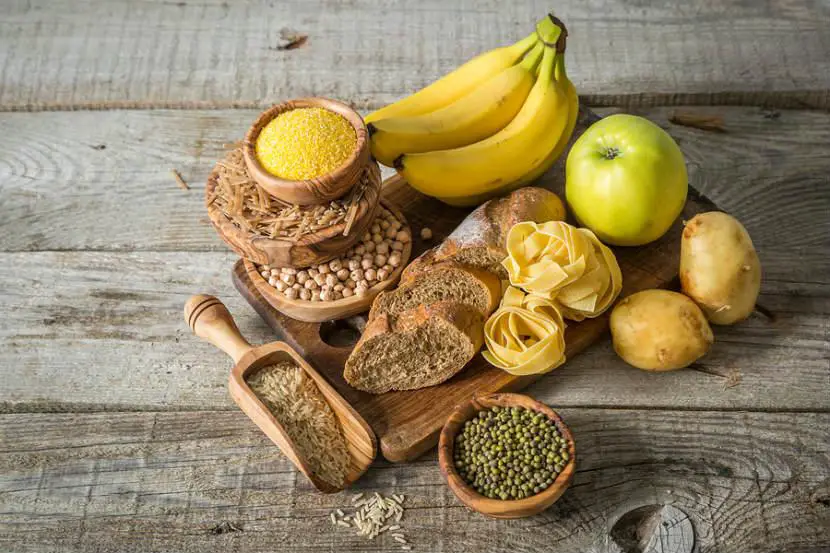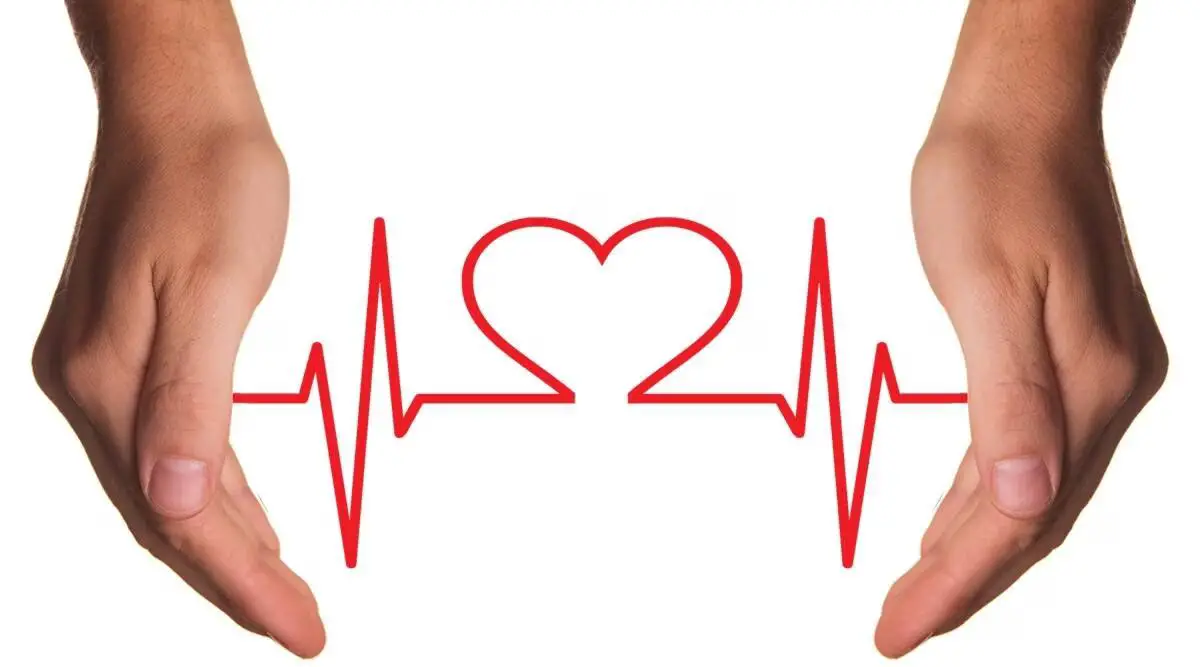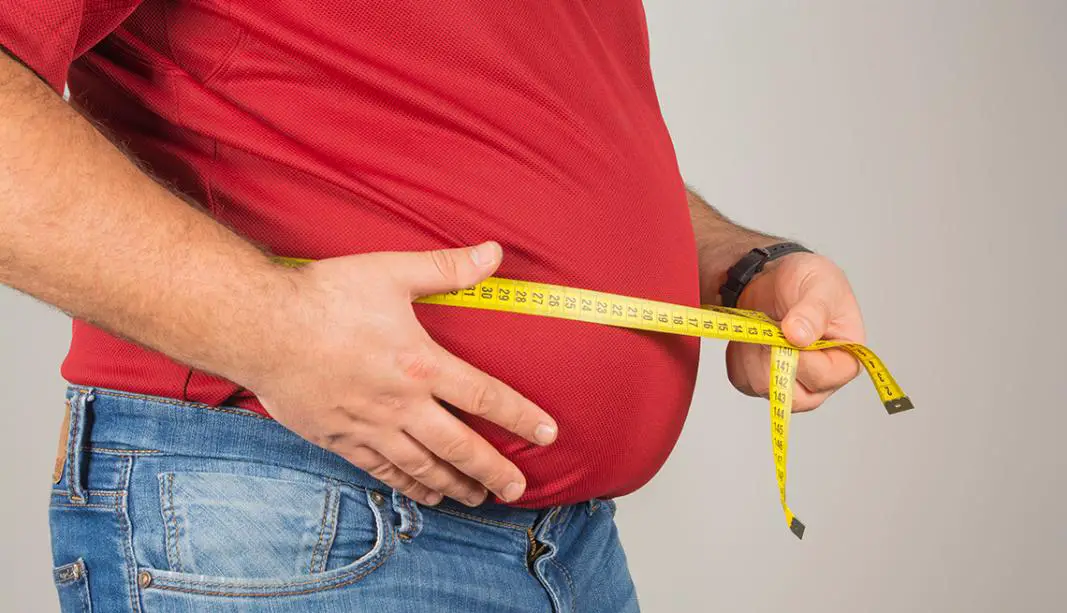[toc]

Myth 1: Carbs Always Lead to Weight Gain
Why Does This Myth Exist?
This myth exists because not everyone understands the role of carbs in the body and the difference between good and bad carbs.
They do not know that not all carbs are the same and that the total number of calories matters more for weight gain.
Debunking the Myth:
The fact is healthy carbs from whole foods like fruits and veggies are not the same as unhealthy carbs from sugary snacks.
It’s not just about carbs; it’s about the overall balance of calories in your diet that influences weight.
Myth 2: Eating Carbs After 6 p.m. Causes More Weight Gain
Why Does This Myth Exist?
This view likely stems from the notion that the body’s metabolism slows down at night, leading to less effective calorie burning.
Debunking the Myth:
This belief doesn’t consider that your body doesn’t operate on a strict schedule.
It’s about the total calories consumed throughout the day, not when you eat them.
Weight gain happens when you consistently eat more calories than your body needs, regardless of the time.
Myth 3: All Carbs Are Processed and Unhealthy
Why Does This Myth Exist?
This belief comes from the rise of processed food, leading to the idea that all carbs are processed and can cause health issues.
People think all carbs are bad mixing up healthy and unhealthy ones.
Debunking the Myth:
Understanding that not all carbs are processed is crucial. Whole grains, fruits, and vegetables are unprocessed carbs that provide essential nutrients.
It’s the refined carbs, like white bread and sugary snacks, that pose health risks. Knowing the difference helps make informed dietary choices.
Myth 4: Cutting Out Carbs Entirely Is the Best Way to Lose Weight
Why Does This Myth Exist?
The notion that cutting out all carbs is the best way to lose weight comes from connecting carb reduction with rapid water weight loss.
Therefore, people think avoiding carbs completely is a quick solution for shedding pounds.
Debunking the Myth:
While reducing carbs can lead to initial weight loss, eliminating them is not sustainable. Carbs are vital for energy, nutrients, and fiber.
The initial weight loss often involves shedding water weight, not fat.
A better approach is to choose nutrient-dense carbs like whole grains, fruits, and veggies while moderating overall calorie intake for long-term weight management.
Myth 5: Bread and Pasta Are the Only Sources of Carbs
Why Does This Myth Exist?
Certain popular diets focus on minimizing or excluding specific food groups, including grains containing bread and pasta.
Likewise, food marketing often highlights bread and pasta as significant sources of energy, reinforcing the association between carbs and these specific products.
These factors mostly contribute to this myth.
Debunking the Myth:
Carbs are found in a variety of foods, not just bread and pasta. Fruits, veggies, legumes, nuts, seeds, and whole grains are rich in different types of carbohydrates.
Believing carbs are only in specific foods overlooks the nutritional diversity available in various food groups.
A well-rounded diet includes a variety of carb sources, ensuring a comprehensive intake of essential nutrients for overall health.
Myth 6: Eating Carbs Causes Mood Swings
Why Does This Myth Exist?
This misconception is rooted in the idea that the body’s response to carb consumption includes quick spikes and crashes in blood sugar, affecting mood stability.
Debunking the Myth:
The impact of carbs on mood is more nuanced than a direct cause-and-effect relationship. While refined carbs can contribute to rapid changes in blood sugar, not all carbohydrates have this effect.
Choosing complex carbohydrates, such as whole grains and fruits, provides a steadier release of glucose, promoting stable blood sugar levels and minimizing mood swings.
Additionally, combining carbs with proteins and fats in balanced meals helps regulate blood sugar, preventing the extreme fluctuations associated with mood swings.
It’s the overall quality of carb choices and the balance of macronutrients that play a role in mood stability rather than carbs being a universal trigger for mood swings.
Myth 7: Carbs Cause Diabetes
Why Does This Myth Exist?
The false belief may stem from the fact that some carbohydrates, particularly simple sugars found in sweets and processed foods, can cause a rapid increase in blood glucose levels.
This oversimplification may lead to the mistaken belief that all carbohydrates are detrimental and can cause diabetes.
Debunking the Myth:
Carbohydrates, especially those with high fiber content from whole foods, are not a direct cause of diabetes. Type 2 diabetes is a complex condition influenced by factors such as genetics, lifestyle, and overall diet.
While excessive consumption of refined carbs and sugary foods may contribute to insulin resistance, a key factor in type 2 diabetes, blaming all carbs oversimplifies the issue.
In fact, a balanced diet that includes healthy carbohydrates from whole grains, fruits, and vegetables can contribute to better blood sugar control and reduce the risk of diabetes.
It’s the quality and quantity of carb intake, along with overall dietary patterns, that play a role in diabetes risk rather than carbs being a singular cause.
Myth 8: Physically Active People Need More Carbs
Why Does This Myth Exist?
This perception stems from the association between carbohydrates and energy, leading to the assumption that more physical activity necessitates an increased intake of carbs.
Debunking the Myth:
While carbohydrates are a crucial energy source, the idea that physically active individuals universally need significantly more carbs oversimplifies nutritional needs.
The optimal carbohydrate intake depends on factors such as the type, intensity, and duration of physical activity, as well as individual metabolic differences.
While endurance athletes may benefit from a higher carb intake to replenish glycogen stores, those in less intense activities or following low-carb diets can adapt to using alternative fuel sources.
It’s essential to tailor carbohydrate intake based on individual energy requirements, activity levels, and overall dietary preferences rather than adhering to a one-size-fits-all approach.
Myth 9: Consuming Carbs Is Bad for Your Heart
Why Does This Myth Exist?
This misconception might stem from a broader dietary shift towards low-carbohydrate or ketogenic diets, which gained popularity for weight loss.
Debunking the Myth:
Carbohydrates, when chosen wisely, contribute to heart health rather than being harmful. Whole, unprocessed carbohydrates, such as fruits, vegetables, and whole grains, are associated with a lower risk of heart disease due to their fiber content, which helps manage cholesterol levels.
It’s the quality of carbs and the overall dietary pattern that matters. Diets rich in refined carbs and added sugars, rather than whole carbs, are linked to an increased risk of heart disease.
Therefore, blaming all carbs for heart issues oversimplifies the nuanced relationship between diet and cardiovascular health. Opting for a heart-healthy diet involves making informed choices within the carbohydrate category rather than avoiding carbs altogether.
Myth 10: Carbs Are Addictive Like Drugs
Why Does This Myth Exist?
The association between carb-rich, sugary foods and pleasurable sensations in the brain contributes to the belief that carbs can be addictive.
Debunking the Myth:
While certain foods, particularly those high in sugar and fat, can activate pleasure centers in the brain, labeling carbs as addictive oversimplifies the complex nature of food cravings.
Addiction involves physiological dependence and withdrawal symptoms, which are not characteristic of carbohydrate consumption. Cravings for certain foods often result from a combination of sensory appeal, habits, and psychological factors rather than true addiction.
Understanding the psychological aspects of food choices and adopting a balanced, mindful approach to eating can help break the misconception that carbs possess addictive qualities akin to drugs.
Myth 11: Eating Carbs Leads to Constant Hunger
Why Does This Myth Exist?
This view often arises from the association between carb-rich snacks and quick spikes in blood sugar, followed by subsequent crashes, leading to increased hunger.
Debunking the Myth:
The type and quality of carbohydrates matter in determining their impact on hunger. Whole, unprocessed carbohydrates, such as fruits, vegetables, and whole grains, contribute to satiety and provide a sustained release of energy.
On the other hand, refined carbohydrates, like sugary snacks, may lead to rapid fluctuations in blood sugar levels, triggering feelings of hunger soon after consumption.
A well-balanced meal that includes a mix of complex carbs, proteins, and healthy fats helps regulate blood sugar levels, promoting a sense of fullness and preventing constant hunger.
It’s not the presence of carbs but the quality and composition of the overall diet that influence satiety.
Myth 12: Eating Carbs Make You Feel Tired and Sluggish
Why Does This Myth Exist?
This myth often stems from misconceptions about the relationship between carbs and energy levels. The association with post-carb meals and the desire for a nap contributes to this belief.
Debunking the Myth:
While it’s true that excessive consumption of refined carbs can lead to temporary energy spikes followed by crashes, not all carbohydrates have this effect.
Opting for complex carbs, such as whole grains, fruits, and vegetables, provides a steady release of energy without the abrupt crashes associated with sugary snacks.
Additionally, pairing carbs with proteins and fats in balanced meals helps maintain stable blood sugar levels, promoting sustained energy throughout the day.
Myth 13: Starchy Foods Are the Only Sources of Carbs
Why Does This Myth Exist?
This misunderstanding arose from a simplified view of carbohydrates as only coming from bread, rice, pasta, and similar staples.
Debunking the Myth:
Carbohydrates are present in a wide array of foods beyond the starchy category. Fruits, vegetables, legumes, and whole grains are rich sources of carbohydrates.
Each food group offers different types of carbs, including fiber, sugars, and complex carbohydrates. Diversifying carb sources ensures a more comprehensive intake of essential nutrients, vitamins, and minerals that contribute to overall health.
Myth 14: All Carbs Are Converted into Sugar in the Body
Why Does This Myth Exist?
This idea arises from a misunderstanding of the digestive process and the metabolic fate of different types of carbohydrates.
Debunking the Myth:
While it’s true that carbohydrates are broken down into glucose (sugar) in the body, not all carbs are created equal.
Whole, unprocessed carbohydrates, such as those found in fruits, vegetables, and whole grains, are metabolized more gradually. They provide a steady release of glucose, avoiding rapid spikes in blood sugar levels.
This is in stark contrast to the quick absorption associated with refined sugars and processed carbs.
The body’s ability to regulate blood sugar levels is influenced by the type and quality of carbohydrates consumed, highlighting the importance of choosing nutrient-dense, whole foods.
Myth 15: Carbs Are Unnecessary for an Active Lifestyle
Why Does This Myth Exist?
The myth exists due to the popularity of certain diet plans that advocate for low-carbohydrate approaches.
While these diets have been successful for some individuals in terms of weight loss, especially those with an active lifestyle.
This leads people to think that carbs are not important
Debunking the Myth:
Carbohydrates play a crucial role in providing readily available energy, especially during high-intensity exercises.
While the body can adapt to using alternative fuel sources, such as fats, during low to moderate activities, carbohydrates remain the primary and preferred energy source during more intense workouts.
Athletes and individuals engaged in vigorous physical activities benefit from a balanced diet that includes adequate carbohydrates to support optimal performance, replenish glycogen stores, and enhance overall endurance.
Restricting carbs excessively may compromise athletic performance and hinder the body’s ability to meet the energy demands of rigorous activities.
Myth 16: Avoid Eating Carbs for Dinner
Why Does This Myth Exist?
This myth stems from the idea that the body’s metabolism slows down in the evening, leading to the assumption that carbs consumed at night are more likely to be stored as fat, therefore, it’s better to avoid them after dinner.
Debunking the Myth:
The timing of carbohydrate consumption is less critical than the overall balance of daily calorie intake. While it’s true that some people may benefit from a more balanced distribution of macronutrients throughout the day, completely avoiding carbs at dinner is unnecessary for everyone.
What matters more is the quality of the carbs consumed. Opting for complex carbohydrates, such as whole grains, vegetables, and legumes, can contribute to a well-rounded and satisfying dinner without negatively impacting weight.
Balancing meals with appropriate portions and a mix of macronutrients is a more sustainable approach to managing weight than restricting carbs based on the time of day.
Myth 17: Carbs Lead to Belly Fat Specifically
Why Does This Myth Exist?
People often think that consuming too many refined carbohydrates and sugars can contribute to fat accumulation, particularly in the abdominal area.
Debunking the Myth:
The location of fat accumulation is influenced by various factors, including genetics and overall body composition.
Consuming excess calories, regardless of the macronutrient, can contribute to weight gain, but singling out carbs as the sole cause of belly fat is inaccurate.
Myth 18: You Can’t Build Muscle on a High-Carb Diet
Why Does This Myth Exist?
There’s a belief that building muscle requires a high-protein diet and that a high-carb diet hinders muscle development.
Debunking the Myth:
Carbohydrates play a crucial role in providing energy for workouts and aiding in muscle recovery.
While protein is essential for muscle synthesis, carbohydrates complement the process by supporting energy-intensive resistance training, enabling better overall muscle development.
Myth 19: Low Carb Diets Are the Only Way to Achieve Long-Term Weight Loss
Why Does This Myth Exist?
The popularity of low-carb diets and their effective results in rapid initial weight loss contribute to this myth.
Debunking the Myth:
Sustainable weight loss is more about creating a caloric deficit and adopting a balanced, nutritious diet rather than focusing solely on reducing carbs.
While low-carb diets can be effective for some, a long-term approach involves finding a dietary pattern that is realistic, enjoyable, and aligns with individual preferences and health goals.
Myth 20: Carbs Are Difficult to Digest
Why Does This Myth Exist?
Personal experiences of bloating or digestive discomfort after consuming carb-rich meals, leading to the assumption that all carbs are difficult to digest.
Debunking the Myth:
The digestibility of carbohydrates varies, with some individuals being more sensitive to specific types. Whole, unprocessed carbohydrates, especially those rich in fiber, can promote healthy digestion.
It’s the refined and heavily processed carbs that may contribute to digestive issues. Choosing a variety of high-fiber carbs, such as fruits, vegetables, and whole grains, supports digestive health and provides essential nutrients.
Myth 21: It’s Better to Eat Just Meat Than Carbs
Why Does This Myth Exist?
This view may stem from the popularity of low-carb and high-protein diets, suggesting that eliminating carbs is the key to optimal health.
Debunking the Myth:
A balanced diet includes a variety of macronutrients, and eliminating carbs can deprive the body of essential nutrients and fiber.
While protein is crucial for various bodily functions, carbs provide energy and other essential nutrients.
A well-rounded diet that includes a mix of proteins, fats, and healthy carbs is a more sustainable and nutritionally complete approach.
Myth 22: Don’t Eat Carbs in Every Meal
Busting the Myth:
There’s a belief that consuming carbs in every meal is unhealthy and contributes to weight gain; therefore, it’s better to be avoided
Why Does This Myth Exist?
The key is not to avoid carbs entirely but to distribute them evenly throughout the day. Opting for complex carbs, such as whole grains and vegetables, in moderation during meals helps maintain steady energy levels and supports overall health.
Balanced meals that include a mix of macronutrients contribute to a well-rounded diet without eliminating carbs from every meal.
Myth 23: Protein Is More Important Than Carbs
Why Does This Myth Exist?
The reason for the popularity of this myth is similar to what we observe in Myth 21, which emphasizes the popularity of low-carb and high-protein diets leads people to think that proteins are superior.
Debunking the Myth:
Both protein and carbohydrates are crucial for a balanced diet. While protein is essential for muscle repair and other bodily functions, carbohydrates provide energy and support various physiological processes.
The body requires a mix of macronutrients to function optimally. Prioritizing one over the other can lead to nutrient imbalances and compromise overall health.
Myth 24: Every Carb Contains Gluten
Why Does This Myth Exist?
This notion might be fueled by the association of gluten with bread, pasta, and other grain-based products. People who follow a gluten-free diet, often due to gluten sensitivity or celiac disease, might mistakenly extend the avoidance of gluten to all carbohydrates.
Debunking the Myth:
Gluten is specific to wheat and some other grains, but many carbohydrates are naturally gluten-free. Fruits, vegetables, legumes, and gluten-free grains such as quinoa and rice are examples of carb sources without gluten.
Therefore, it’s not accurate to assume that every carb contains gluten.
Myth 25: You Will Not Get Fiber Through Carbs
Why Does This Myth Exist?
This misunderstanding could stem from a focus on low-quality carbs, often associated with processed foods, where fiber is often removed.
Additionally, popular low-carb diets may contribute to the belief that carbohydrates, in general, lack fiber.
Debunking the Myth:
Many carbohydrate-rich foods, especially whole grains, fruits, and vegetables, are excellent sources of dietary fiber. Fiber is a type of carbohydrate that supports digestive health, regulates blood sugar levels, and contributes to satiety.
Choosing high-fiber carbs as part of a balanced diet ensures the intake of essential dietary fiber for overall well-being.
Carbs Myths FAQs
1. What is unhealthy about carbs?
Excessive consumption of refined carbs, like sugary snacks and white bread, can lead to weight gain and blood sugar spikes. Processed carbs often lack essential nutrients found in whole foods.
2. Why you shouldn’t avoid carbs?
Carbs are a primary energy source for the body, supporting vital functions. Whole, unprocessed carbs like fruits, vegetables, and whole grains provide essential nutrients, fiber, and sustained energy.
3. What is the carb trick?
The “carb trick” involves choosing complex carbs over refined ones. Opt for nutrient-dense sources that release energy steadily, preventing rapid blood sugar spikes and crashes.
4. Can I eat carbs and still lose weight?
Yes, incorporating the right carbs into a balanced diet can aid weight loss. Choose whole grains, fruits, and vegetables in appropriate portions while maintaining a caloric deficit.
5. Is it better to cut carbs or fat?
The key is balance. Reducing excessive intake of refined carbs and unhealthy fats while maintaining a well-rounded diet with essential fats and complex carbs is ideal for overall health.
6. What are the 5 foods that burn belly fat?
Certain foods, like avocados, berries, and fatty fish, may support fat loss. However, spot reduction is a myth; a holistic approach including a balanced diet and exercise is crucial.
7. Can I eat carbs and lose belly fat?
Yes, focusing on whole, high-fiber carbs can contribute to belly fat loss. Pairing carbs with proteins and fats in balanced meals helps regulate blood sugar and promote satiety.
8. Which carbs are good for fat loss?
Complex carbs like quinoa, sweet potatoes, and oats are excellent choices. They provide sustained energy, fiber, and essential nutrients without causing rapid blood sugar fluctuations.
9. Do you have to stay away from carbs to lose weight?
No, but choosing the right carbs and controlling portions is crucial. Whole, nutrient-dense carbs can be part of a successful weight-loss strategy when combined with a balanced diet and exercise.
10. How long should I not eat carbs to lose weight?
There’s no universal duration. Instead of avoiding carbs entirely, focus on quality and quantity. Gradual changes to a sustainable, balanced diet are more effective for long-term weight management.



